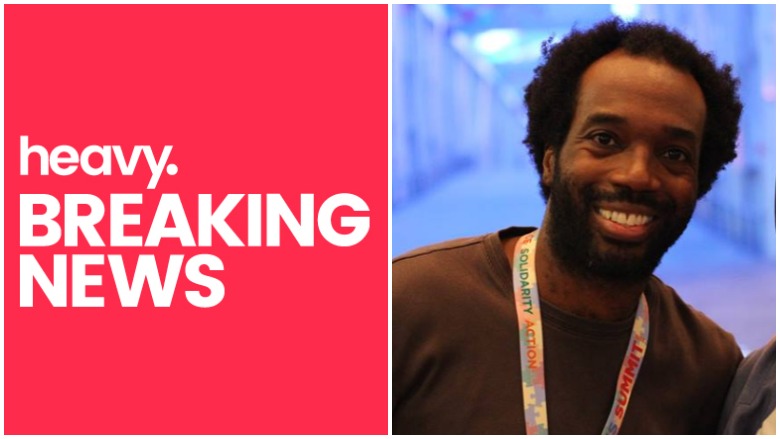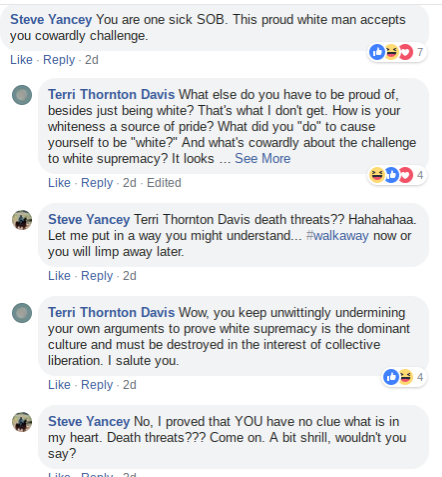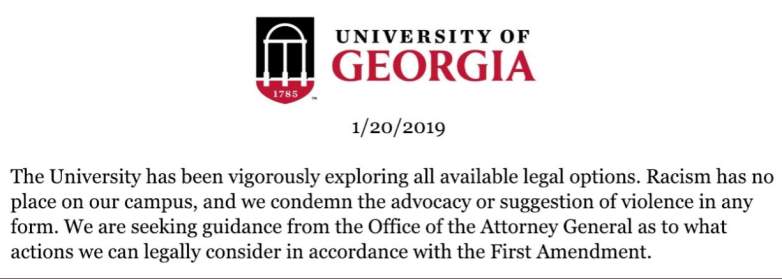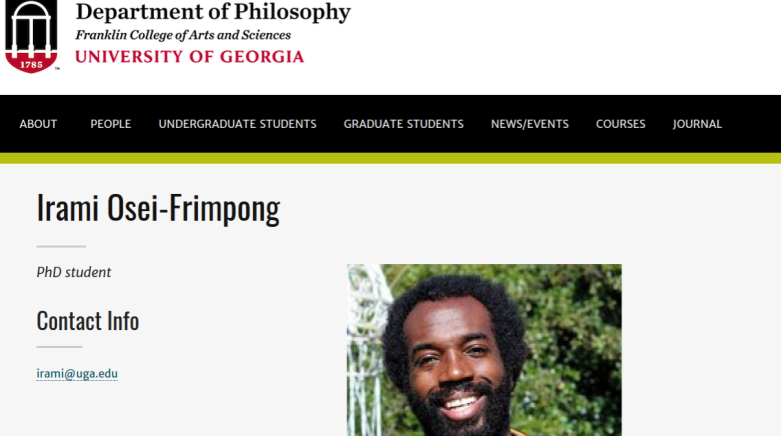
Irami Osei-Frimpong is a graduate student and teaching assistant at the University of Georgia. The philosophy Ph.D. candidate has come under fire for remarks made on Facebook and YouTube where he suggests that in the struggle for equality for African-Americans, some white people have to die.
The university has issued a statement condemning the speech proffered by its instructor and graduate student Osei-Frimpong adding it’s seeking “guidance” from the state attorney general on the matter “as to what actions we can legally consider in accordance with the First Amendment.” The Atlanta-Journal Constitution confirmed in its reporting that the Georgia Office of the Attorney General has the matter “under review.”
Osei-Frimpong has since defended and explained his stance on social media. Commentary on his Facebook posts runs the gamut from accepting to threatening.
Here’s what you need to know:
1. ‘Some White People May Have to Die for Black Communities to be Made Whole in This Struggle to Advance to Freedom,’ Osei-Frimpong Wrote
The original comment, now deleted, Osei-Frimpong wrote, “Some white people may have to die for black communities to be made whole in this struggle to advance to freedom.” The post was on the ‘Overheard at UGA’ Facebook page, as was originally reported by Campus Reform.
In a follow-up post on his own Facebook page after Campus Reform published his comment and the backlash was swift, he wrote, “The idea that some White people may have to die for freedom isn’t particularly shocking. We have a standing army and an armed domestic police force. I think what’s offensive is the notion that some White people may have to die for Black people to be free. It’s as if White cultural entitlement along racial lines isn’t shot through with the threat of violence and reprisal. The fear of unchecked White violence is always in the room. And it isn’t necessarily physical violence.
The comments on his Facebook page are not unpredictable. Some just call his comments with reasoned and calm rebuttal. Others threaten outright violence as a counter to the violence they allege he has threatened in his comments.

Osei-Frimpong continued to address the original post and expanded on his position. And brought up Heather Heyer, the woman run down and killed at the Charlottesville Unite the Right rally in 2017.
“Heather Heyer died for going to a rally against White supremacists. She didn’t wake up that day to die. She woke up that day to go to a rally against White supremacy. But she paid the price. That’s simply what justice costs. Our unwillingness to pay that price is why we ended Reconstruction.”
And he has doubled-down on his original comment and in response to people angry says, “I’m starting to realize that when people say non-violent, they mean, ‘I don’t want to do anything that may make the oppressor or the oppressed violent.'”
“That’s not protest; that’s a parade or an art project or a workshop THAT IS STILL ALWAYS CALIBRATED TO THE SENSIBILITY OF THE OPPRESSOR.
That’s not what King or Gandhi were talking about. That was NEVER what they were talking about. They were talking about maintaining your humanity in the face of your oppressor’s immoderate violence; not structuring your movement around not making your oppressor too mad. The pen-ultimate step of an effective non-violent movement ends with documented immoderate violence. It’s just not immoderate violence by you”.
2. In a Follow-up YouTube Video, Osei-Frimpong Says ‘Fighting White People is a Skill’
In the near-hour long video, Osei-Frimpong calls for a nonviolent fight for equality for African-Americans. The comments are not opaque and are of to precise minds: one side supportive the other antagonistic and some unafraid to share their racism and white supremacist views as well.
“Why would you fight the superior race that feeds you.,” Jason Beacham asked rhetorically.
“Thank you for your courage. You have said such truth in this video. This is the truth about Spiritual Warfare,” said Charles Rozier.
Osei-Frimpong continues:
“Before white people will shoot you, they’ll try to take your job, they’ll try to take your house, they’ll threaten you, they’ll send you to prison,” he said. “The amount of fear … in black communities of white people is just horrifying.”
3. A UGA Statement Reads That it ‘Condemns’ Racism & Violence & is Considering Legal Action & Osei-Frimpong & a First Amendment Group Responds

In an email to Heavy, University of Georgia Executive Director of Media Communications Greg Trevor wrote, “The University is aware of statements made by a PhD student and Graduate Teaching Assistant” adding that the university denounces racism and violence.
“The University has been vigorously exploring all available legal options. Racism has no place on our campus, and we condemn the advocacy or suggestion of violence in any form. We are seeking guidance from the Office of the Attorney General as to what actions we can legally consider in accordance with the First Amendment.”
Osei-Frimpong responded.

The Foundation for Individual Rights in Education, Fire, wrote a letter reminding the university of how the First Amendment works, and detailing the chain of events including a UGA statement that says any Osei-Frimpong comments were made by him as a private citizen and that his speech was protected. Fire also published a detailed account of the Osei-Frimpong story that actually began in 2018 September
“The saga started on Sept. 12, 2018, when Osei-Frimpong spoke at a public meeting of the Young Democrats of UGA, where he was identified as a “local activist.” Andrew Lawrence, then a student at UGA, had seen social media posts from Osei-Frimpong he found offensive. During the question-and-answer session, Lawrence recorded himself confronting Osei-Frimpong about what Lawrence describes as “negative rhetoric against white people when you don’t know every white person” at UGA.”
The university told the Atlanta Journal Constitution that Osei-Frimpong’s job as a teaching assistant, which began in 2016, “include leading a discussion for a class taught by a professor.”
And Osei-Frimpong notes he is not a black nationalist.
“Someone just asked me if I were a black nationalist. For the record, I’m actually an integrationist. I’m just not going to integrate on my knees.”
4. On His YouTube Channel, ‘The Funky Academic,’ Osei-Frimpong Shares ‘Basic Philosophy to a Dope Beat’
The videos on his YouTube channel, with nearly 7,000 subscribers, ‘The Funky Academic’ numbering around 140, might surprise some who may expect Osei-Frimpong to be radically left. Some of his positions are center. For example, he is opposed to shuttering U.S. Immigration and Customs Enforcement as some have called for and says of the #MeToo movement the “things we do to protect women create guys like” now-Supreme Court Associate Justice Brett Kavanaugh.
“I trust women, but they are terrifying,” he says.
His ‘Unable to see white women as harm,’ video is a clip of Allison Williams from ‘Get Out! explaining the failure of some to recognize her character in the film is “evil.”
“…They say, ‘but maybe she’s also a victim,” Williams says in the clip from the Seth Meyers Show. “I’m like, No!’ I will say that is one hundred percent white people that say that to me.”
Osei-Frimpong’s wife Bonnie is white and a reverend.
5. Osei-Frimpong, Originally From California, Graduated From the University of California Berkley and Brandeis University & is Married to Rev. Bonnie Osei-Frimpong
Osei-Frimpong attended Laguna Hills High School, where he was an academic and an athlete, and has degrees from the University of California Berkley and Brandeis University.
Osei-Frimpong and his wife Bonnie have three young children. Bonnie Osei-Frimpong is a reverend and director of the National Benevolent Association’s XPLOR program, a “faith-based, 10-month residency program for young people “to explore lives of care and service.”
The National Benevolent Association is the health and social services general ministry of the Christian Church, known as the Disciples of Christ. She worked with Church World Service Indonesia and the American Red Cross to develop and implement “education policy, disaster response, citizenship formation, economic justice, and HIV/AIDS prevention and response programs.”
The couple had a multi-media production company, Another Chance Productions, that has as its goal producing films “to support community groups working for Chicago neighborhoods …to help groups access stakeholders clients patrons and staff in addition ACP delves into original programming that focuses on community involvement and struggles for justice …”